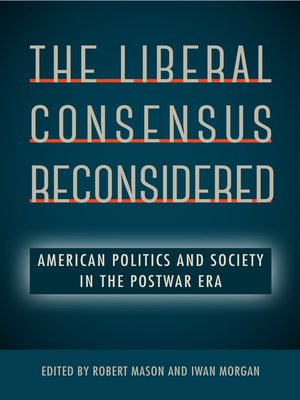The Liberal Consensus Reconsidered
ebook ∣ American Politics and Society in the Postwar Era
By Robert Mason

Sign up to save your library
With an OverDrive account, you can save your favorite libraries for at-a-glance information about availability. Find out more about OverDrive accounts.
Find this title in Libby, the library reading app by OverDrive.



Search for a digital library with this title
Title found at these libraries:
| Library Name | Distance |
|---|---|
| Loading... |
When first published in 1976, Godfrey Hodgson's America in Our Time won immediate recognition as a major interpretive study of the postwar era. Although the term liberal consensus, or its approximation, had received some previous expression, Hodgson was responsible for its entry into the lexicon of American history. Yet what he considered a substantive phenomenon would inevitably become a controversial paradigm as a massive outpouring of literature cited evidence of a significant conservative presence at the grassroots level from the 1930s to the 1960s. Here, leading scholars—including Hodgson himself—confront the longstanding theory that a liberal consensus shaped the United States after World War II. The essays draw on fresh research to examine how the consensus related to key policy areas, how it was viewed by different factions and groups, what its limitations were, and why it fell apart in the late 1960s. They find that although elite politicians from both parties did share certain principles that gave direction to postwar America, the nation still experienced major political, cultural, and ideological conflict Identifying the forces at work that gave rise to a newly confident conservatism promoted by corporate leaders, Sunbelt boosters, and religious activists, the contributors offer new insights into the era and diverging opinions on one of the most influential interpretations of mid-twentieth-century U.S. history.







